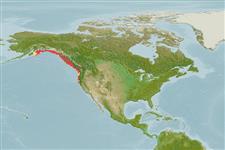Teleostei (teleosts) >
Perciformes/Scorpaenoidei (Scorpionfishes) >
Sebastidae (Rockfishes, rockcods and thornyheads) > Sebastinae
Etymology: Sebastes: Greek, sebastes = august, venerable (Ref. 45335); emphaeus: From the Greek emphaeus, meaning 'display' (Ref. 27436).
More on author: Starks.
Environment: milieu / climate zone / depth range / distribution range
Ecology
Marine; reef-associated; depth range 0 - 366 m (Ref. 27437). Temperate; 60°N - 38°N, 152°W - 120°W
Northeast Pacific: Kenai Peninsula, Alaska to northern California, USA.
Length at first maturity / Size / Weight / Age
Maturity: Lm 12.2 range ? - ? cm
Max length : 18.0 cm TL male/unsexed; (Ref. 2850)
Short description
Identification keys | Morphology | Morphometrics
Dorsal spines (total): 13; Dorsal soft rays (total): 14 - 15; Anal spines: 3; Anal soft rays: 7. Head spines strong to moderate - nasal, preocular, postocular, tympanic and parietal spines present, supraocular, coronal and nuchal spines absent; anal fin rounded (Ref. 27437). Caudal fin weakly forked (Ref. 6885). Reddish brown to copper with dark blotches dorsally, fading to white, often with a dark stripe ventrally; red mouth; fins transparent, tinged with pink (Ref. 27437).
Inhabits reefs and rocky shorelines and found in loose congregations hovering above the bottom or resting among caves and crevices (Ref. 27436). Seeks shelter in areas of strong current (Ref. 2850). Viviparous (Ref. 34817). Flesh is tasty and flaky, but since it is rarely caught, it is seldom used as a food fish (Ref. 2850, 27436). May be used as bait for large rockfish, lingcod or cabezon (Ref. 27436).
Eschmeyer, W.N., E.S. Herald and H. Hammann, 1983. A field guide to Pacific coast fishes of North America. Boston (MA, USA): Houghton Mifflin Company. xii+336 p. (Ref. 2850)
IUCN Red List Status (Ref. 130435: Version 2024-1)
Threat to humans
Harmless
Human uses
Fisheries: commercial; aquarium: public aquariums; bait: occasionally
Tools
Special reports
Download XML
Internet sources
Estimates based on models
Preferred temperature (Ref.
123201): 5.6 - 9.1, mean 6.9 °C (based on 125 cells).
Phylogenetic diversity index (Ref.
82804): PD
50 = 0.5000 [Uniqueness, from 0.5 = low to 2.0 = high].
Bayesian length-weight: a=0.01202 (0.00651 - 0.02221), b=3.09 (2.93 - 3.25), in cm total length, based on LWR estimates for this species & Genus-body shape (Ref.
93245).
Trophic level (Ref.
69278): 3.3 ±0.2 se; based on diet studies.
Resilience (Ref.
120179): Medium, minimum population doubling time 1.4 - 4.4 years (K=0.54-0.70; tm=1.9; tmax=13; Fec=3,295).
Fishing Vulnerability (Ref.
59153): Low vulnerability (20 of 100).
Nutrients (Ref.
124155): Calcium = 17.5 [5.7, 57.6] mg/100g; Iron = 0.188 [0.071, 0.478] mg/100g; Protein = 18.5 [17.2, 19.9] %; Omega3 = 0.906 [0.322, 2.494] g/100g; Selenium = 21.7 [7.0, 72.2] μg/100g; VitaminA = 106 [31, 382] μg/100g; Zinc = 0.506 [0.244, 0.954] mg/100g (wet weight);
